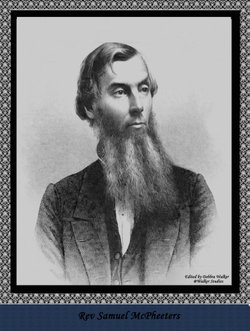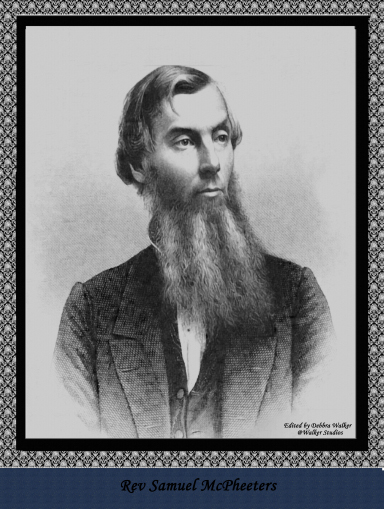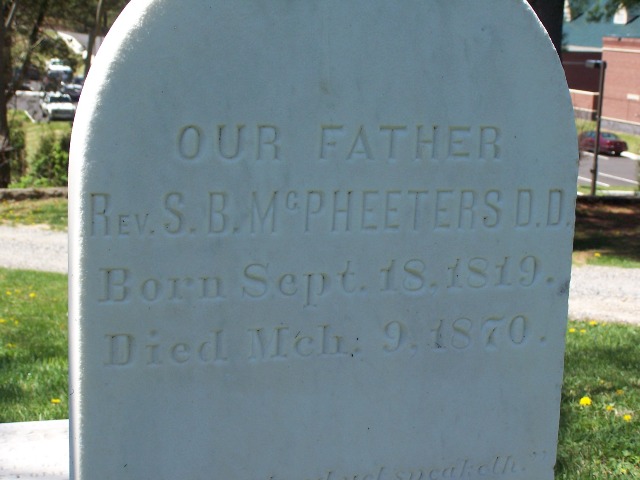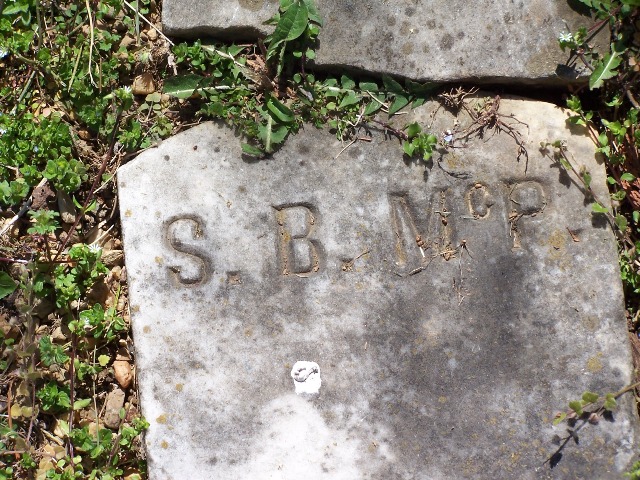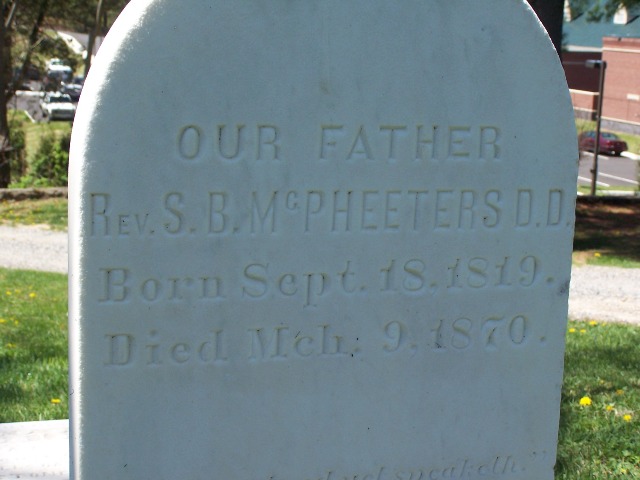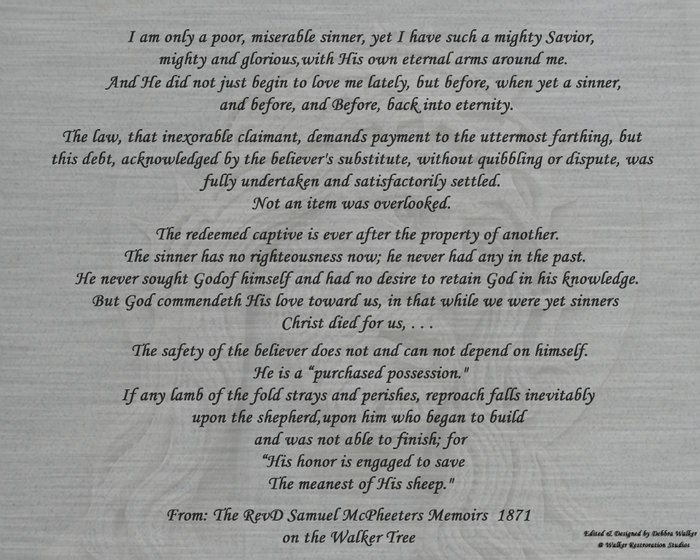As the pastor of the Pine Street Church his career became historic. In the summer of .1860, for reasons of health, he betook himself and family to Fort Union, New Mexico, with the commission of a chaplain in the United States Army. While there news came of the outbreak of hostilities.
Dr. McPheeters returned to St. Louis, and was warmly welcomed by his congregation. He was confirmed in his determination, on the one hand, to set an example of loyalty by scrupulous discharge of the obligations of the oath of allegiance which he had taken as a chaplain in the army, and, on the other hand, as a minister and pastor ''not to know anything save Jesus Christ and Him crucified."
As a commissioner to the General Assembly of the Presbyterian Church, in 1862, he opposed the adoption of a paper on "The State of the Country," on the ground that the constitution of the church prohibits its courts "to handle or conclude anything save that which is ecclesiastical, or to meddle with civil affairs which concern the Commonwealth." For this opposition the author of the paper, the late Rev. Dr. Robert J. Breckenridge, arraigned him, and the issue came into Dr. McPheeters' church, and became a noted case in the city and State. The military authorities of the department finally ordered Dr. McPheeters to cease to exercise the functions of his office within the State, and, with his wife, to leave Missouri in ten days for exile in a Northern State, and remain there during the war. President Lincoln countermanded the order. His behest was obeyed to the extent of permitting Dr. McPheeters to remain in the State, but not removing the prohibition to preach or perform other ministerial duty. Learning this fact, Mr. Lincoln issued his famous order declaring that the government could not attempt to run the churches. Under this order Dr. McPheeters was free to resume his pastoral work, but his church deprived him of his pastorate, his adherents being excluded from the meeting at which this was done. An account of these events is to be found in "Memoir of S. B. McPheeters, D. D.," by the Rev. John S. Grasty. Dr. McPheeters accepted a call to the Mulberry (Kentucky) Church. Here his health gave way rapidly, until, unable to sit or stand, he was confined to a. couch, on which he was borne to the house of worship and, in a recumbent position, conducted services. About this time,the war being over, he was recalled by the Pine Street Church in St. Louis, and in response he came on his couch to meet his friends and to say that his enfeebled physical condition compelled him to decline their invitation.
Returning to Kentucky, his disease made quick progress, and on the 8th of March, 1870, his death occurred. He left a widow, who was Miss Eliza C. Shanks, of Virginia, and two sons and two daughters. One daughter and the sons—Mr. Thomas S. McPheeters, of St. Louis, and Professor W. M. McPheeters, D. D., of the Theological Seminary, Columbia, South Carolina—survive their parents.
Dr. McPheeters was the first person on whom Westminster College, at Fulton, Missouri, conferred the degree of doctor of divinity, in 1859. From the Public Domain Book by Louis Conrad
As the pastor of the Pine Street Church his career became historic. In the summer of .1860, for reasons of health, he betook himself and family to Fort Union, New Mexico, with the commission of a chaplain in the United States Army. While there news came of the outbreak of hostilities.
Dr. McPheeters returned to St. Louis, and was warmly welcomed by his congregation. He was confirmed in his determination, on the one hand, to set an example of loyalty by scrupulous discharge of the obligations of the oath of allegiance which he had taken as a chaplain in the army, and, on the other hand, as a minister and pastor ''not to know anything save Jesus Christ and Him crucified."
As a commissioner to the General Assembly of the Presbyterian Church, in 1862, he opposed the adoption of a paper on "The State of the Country," on the ground that the constitution of the church prohibits its courts "to handle or conclude anything save that which is ecclesiastical, or to meddle with civil affairs which concern the Commonwealth." For this opposition the author of the paper, the late Rev. Dr. Robert J. Breckenridge, arraigned him, and the issue came into Dr. McPheeters' church, and became a noted case in the city and State. The military authorities of the department finally ordered Dr. McPheeters to cease to exercise the functions of his office within the State, and, with his wife, to leave Missouri in ten days for exile in a Northern State, and remain there during the war. President Lincoln countermanded the order. His behest was obeyed to the extent of permitting Dr. McPheeters to remain in the State, but not removing the prohibition to preach or perform other ministerial duty. Learning this fact, Mr. Lincoln issued his famous order declaring that the government could not attempt to run the churches. Under this order Dr. McPheeters was free to resume his pastoral work, but his church deprived him of his pastorate, his adherents being excluded from the meeting at which this was done. An account of these events is to be found in "Memoir of S. B. McPheeters, D. D.," by the Rev. John S. Grasty. Dr. McPheeters accepted a call to the Mulberry (Kentucky) Church. Here his health gave way rapidly, until, unable to sit or stand, he was confined to a. couch, on which he was borne to the house of worship and, in a recumbent position, conducted services. About this time,the war being over, he was recalled by the Pine Street Church in St. Louis, and in response he came on his couch to meet his friends and to say that his enfeebled physical condition compelled him to decline their invitation.
Returning to Kentucky, his disease made quick progress, and on the 8th of March, 1870, his death occurred. He left a widow, who was Miss Eliza C. Shanks, of Virginia, and two sons and two daughters. One daughter and the sons—Mr. Thomas S. McPheeters, of St. Louis, and Professor W. M. McPheeters, D. D., of the Theological Seminary, Columbia, South Carolina—survive their parents.
Dr. McPheeters was the first person on whom Westminster College, at Fulton, Missouri, conferred the degree of doctor of divinity, in 1859. From the Public Domain Book by Louis Conrad
Inscription
Our Father
Family Members
-
![]()
James Granberry McPheeters
1813–1893
-
Mary Elizabeth McPheeters
1814–1815
-
![]()
William Marcellus McPheeters
1815–1905
-
![]()
Margaret Ann McPheeters Wilson
1817–1842
-
![]()
Susan Octavia McPheeters II
1823–1846
-
![]()
Catherine Mary McPheeters
1826–1874
-
![]()
Alexander Miller McPheeters Sr
1828–1903
-
![]()
David Brainerd McPheeters
1830–1836
-
Tenant McDaniel McPheeters
1833–1833
-
![]()
Jane Elizabeth McPheeters
1834–1874
